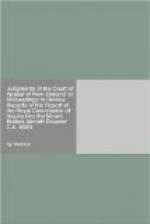We are satisfied that the findings contained in each of paragraphs 348 and 377 are collateral assessments of conduct made outside of and were not needed to answer any part of the terms of reference. The Commissioner had no authority or jurisdiction to deal with the affected officers in such a fashion and the findings themselves are a regrettable addition to the Report.
Fairness
The concept of natural justice does not rest upon carefully defined rules or standards that must always be applied in the same fixed way. Nor is it possible to find answers to issues which really depend on fairness and commonsense by legalistic or theoretical approaches. What is needed is a broad and balanced assessment of what has happened and been done in the general environment of the case under consideration.
In the present case the expressed complaints turn upon the absence of warning that the affected officers were at risk and that the critical decisions taken against them were unsupported by any evidence of probative value. But in estimating the significance of these complaints it would be unreal to ignore the fact that the findings are not only very serious in themselves: they are made more potent by the way they have been so closely associated with one another. Furthermore, each of them is advanced in this Report as an overt manifestation of one general conspiracy. That last matter has special importance because for the reasons just explained we have held the conspiracy findings to be unjustified. They should never have been made. In saying that we do not overlook the fact that this Court is making an assessment in isolation from the viva voce evidence given at open hearings of the Inquiry. But the present issue is simply whether the affected officers were or were not deprived of the advantage of answering unformulated charges. In such a situation the advantage of actually hearing and seeing a witness is hardly a relevant consideration.
In the course of the survey that has been made up to this point we have commented upon the nature and significance of the various challenged paragraphs in the Report. It is unnecessary to traverse the same subject matter once again and we simply remark that the applicants have justified their complaints concerning the way in which the findings have been reached.
Award of Costs
We have explained earlier in this judgment that an order for costs was made against Air New Zealand in favour of parties other than the Civil Aviation Division. As a matter of company policy the airline decided that it would comply with that order although in doing so it has made no admission that the order was validly made. In addition, however, the airline was ordered to pay the Department of Justice the large sum of $150,000 by way of contribution to the public cost of the inquiry. It is that last order which is challenged in the present proceedings on two grounds. The first is that the award involved a wrong exercise of the discretion provided by s. 11 of the Commissions of Inquiry Act 1908. The second ground is that in any event no award greater than $600 could be made by reason of Rule III of rules made in terms of the statute and gazetted on 11th February 1904.




